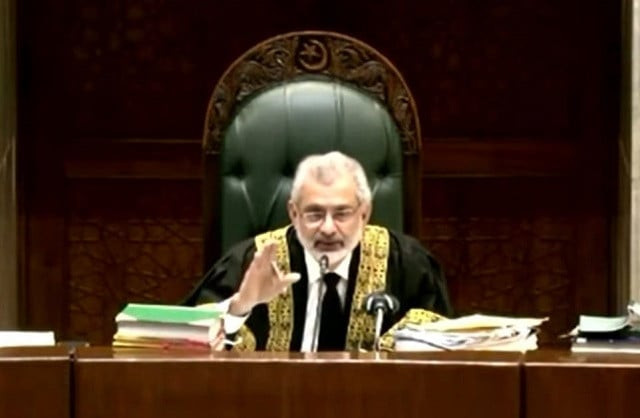All cases must not end up in SC: Isa
CJ emphasises imposing substantial costs on people filing frivolous cases

Chief Justice of Pakistan (CJ) Qazi Faez Isa has emphasised the importance of using modern technology to improve the country's justice system, saying that the practice of taking every matter to the Supreme Court must cease.
“This concept that has developed in the country, of taking virtually every matter right up to the SC before one is satisfied, must come to an end if we want this system to survive,” Justice Isa said.
The CJ was speaking at an event held here at the Federal Judicial Academy (FJA) after the inauguration of a training programme for the district judiciary.
The top judge emphasised that the judiciary must impose “substantial” costs on people who continually initiate frivolous litigations just because they have nothing to lose or because they want to gain time.
“Of course, this [imposition of cost] has to be done in a way that is uniform among all [judges]. It [cost] should not vary too much [among judges],” he added.
The CJ said in order to enhance public trust in the judiciary, the Supreme Court banks on district judiciary. "The first interaction of litigants is not with the high courts or the Supreme Court but with the district judiciary. Strengthening the role of district judiciary will reduce the burden of cases on the higher judiciary."
He said the use of technology has gradually begun in the justice system. Technology, Justice Isa said, is as significant a tool for knowledge as a pen.
“Modern technology is also being used in the Supreme Court; the implementation of technology will bring further transparency in the justice system. A better justice system will reduce the backlog of cases," he said.
Justice Isa said as the chief justice, he directly broadcasted the proceedings of the SC (Practice and Procedure) Act case.
“Broadcasting the hearing directly will allow the general public to witness justice being served.”
The CJ appreciated the direct linkage of district judiciary with the FJA through the internet, expressing contentment with the use of technology.
The judge said he came to know that he was also the FJA chairman only after becoming the chief justice.
“The academy operates under a strong board, comprising all key figures. Around 3,200 judges across the country are performing their duties, undergoing training at various stages within the academy," he said
The CJ said high courts were the supervisors of the subordinate judiciary and the chief justices of the high courts should also get the court staff trained at judicial academies.
"During the training of judges, they should also be made aware of environmental protection. We must pay due attention to environmental conservation for future generations," he added.



















COMMENTS
Comments are moderated and generally will be posted if they are on-topic and not abusive.
For more information, please see our Comments FAQ